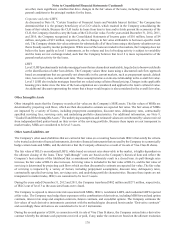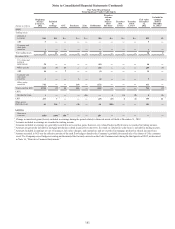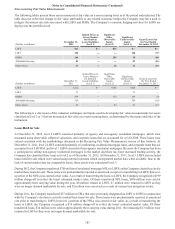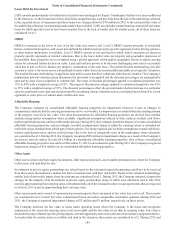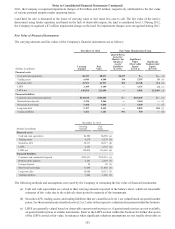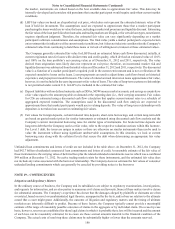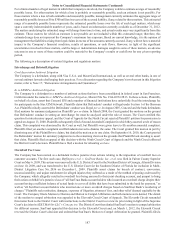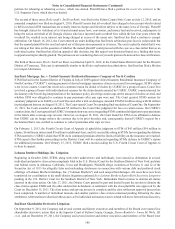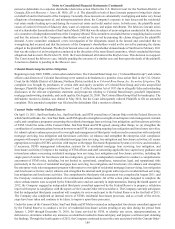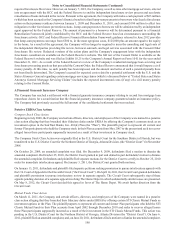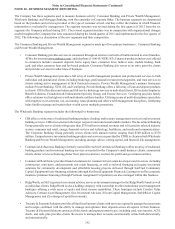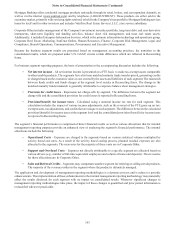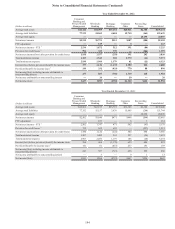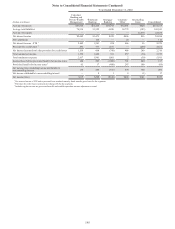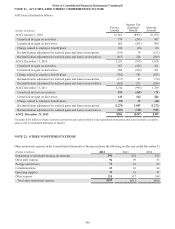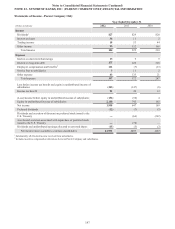SunTrust 2012 Annual Report Download - page 203
Download and view the complete annual report
Please find page 203 of the 2012 SunTrust annual report below. You can navigate through the pages in the report by either clicking on the pages listed below, or by using the keyword search tool below to find specific information within the annual report.Notes to Consolidated Financial Statements (Continued)
187
For a limited number of legal matters in which the Company is involved, the Company is able to estimate a range of reasonably
possible losses. For other matters for which a loss is probable or reasonably possible, such an estimate is not possible. For
those matters where a loss is both estimable and reasonably possible, management currently estimates the aggregate range of
reasonably possible losses as $0 to $300 million in excess of the accrued liability, if any, related to those matters. This estimated
range of reasonably possible losses represents the estimated possible losses over the life of such legal matters, which may
span a currently indeterminable number of years, and is based on information currently available as of December 31, 2012.
The matters underlying the estimated range will change from time to time, and actual results may vary significantly from this
estimate. Those matters for which an estimate is not possible are not included within this estimated range; therefore, this
estimated range does not represent the Company’s maximum loss exposure. Based on current knowledge, it is the opinion of
management that liabilities arising from legal claims in excess of the amounts currently accrued, if any, will not have a material
impact to the Company’ s financial condition, results of operations, or cash flows. However, in light of the significant
uncertainties involved in these matters, and the large or indeterminate damages sought in some of these matters, an adverse
outcome in one or more of these matters could be material to the Company’s results or cash flows for any given reporting
period.
The following is a description of certain litigation and regulatory matters.
Interchange and Related Litigation
Card Association Antitrust Litigation
The Company is a defendant, along with Visa U.S.A. and MasterCard International, as well as several other banks, in one of
several antitrust lawsuits challenging their practices. For a discussion regarding the Company’s involvement in this litigation
matter, refer to Note 17, “Reinsurance Arrangements and Guarantees.”
In re ATM Fee Antitrust Litigation
The Company is a defendant in a number of antitrust actions that have been consolidated in federal court in San Francisco,
California under the name In re ATM Fee Antitrust Litigation, Master File No. C04-2676 CR13. In these actions, Plaintiffs,
on behalf of a class, assert that Concord EFS and a number of financial institutions have unlawfully fixed the interchange fee
for participants in the Star ATM Network. Plaintiffs claim that Defendants’ conduct is illegal under Section 1 of the Sherman
Act. Plaintiffs initially asserted the Defendants’ conduct was illegal per se. In August 2007, Concord and the bank defendants
filed motions for summary judgment on Plaintiffs’ per se claim. In March 2008, the Court granted the motions on the ground
that Defendants’ conduct in setting an interchange fee must be analyzed under the rule of reason. The Court certified this
question for interlocutory appeal, and the Court of Appeals for the Ninth Circuit rejected Plaintiffs’ petition for permission to
appeal on August 13, 2008. Plaintiffs subsequently filed a Second Amended Complaint in which they asserted a rule of reason
claim. This complaint was dismissed by the Court as well, but Plaintiffs were given leave to file another amended complaint.
Plaintiffs filed yet another complaint and Defendants moved to dismiss the same. The Court granted this motion in part by
dismissing one of the Plaintiffs two claims, but denied the motion as to one claim. On September 16, 2010, the Court granted
the Defendants’ motion for summary judgment as to the remaining claim on the grounds that Plaintiffs lack standing to assert
that claim. Plaintiffs filed an appeal of this decision with the Ninth Circuit Court of Appeals and the Ninth Circuit affirmed
the District Court's decision. Plaintiffs have filed a motion for rehearing en banc.
Overdraft Fee Cases
The Company has been named as a defendant in three putative class actions relating to the imposition of overdraft fees on
customer accounts. The first such case, Buffington et al. v. SunTrust Banks, Inc. et al. was filed in Fulton County Superior
Court on May 6, 2009. This action was removed to the U.S. District Court for the Northern District of Georgia, Atlanta Division
on June 10, 2009, and was transferred to the U.S. District Court for the Southern District of Florida for inclusion in Multi-
District Litigation Case No. 2036 on December 1, 2009. Plaintiffs assert claims for breach of contract, conversion,
unconscionability, and unjust enrichment for alleged injuries they suffered as a result of the method of posting order used by
the Company, which allegedly resulted in overdraft fees being assessed to their joint checking account, and purport to bring
their action on behalf of a putative class of “all SunTrust Bank account holders who incurred an overdraft charge despite their
account having a sufficient balance of actual funds to cover all debits that have been submitted to the bank for payment,” as
well as “all SunTrust account holders who incurred one or more overdraft charges based on SunTrust Bank’s reordering of
charges.” Plaintiffs seek restitution, damages, expenses of litigation, attorneys’ fees, and other relief deemed equitable by the
Court. The Company filed a Motion to Dismiss and Motion to Compel Arbitration and both motions were denied. The denial
of the motion to compel arbitration was appealed to the Eleventh Circuit Court of Appeals. The Eleventh Circuit remanded
this matter back to the District Court with instructions to the District Court to review its prior ruling in light of the Supreme
Court’s decision in AT&T Mobility LLC v. Concepcion. The District Court then denied SunTrust's motion to compel arbitration
for different reasons. SunTrust appealed this decision to the Eleventh Circuit and, on March 1, 2012, the Eleventh Circuit
reversed the District Court's decision and ordered that SunTrust's Motion to Compel Arbitration be granted. Plaintiffs filed a



